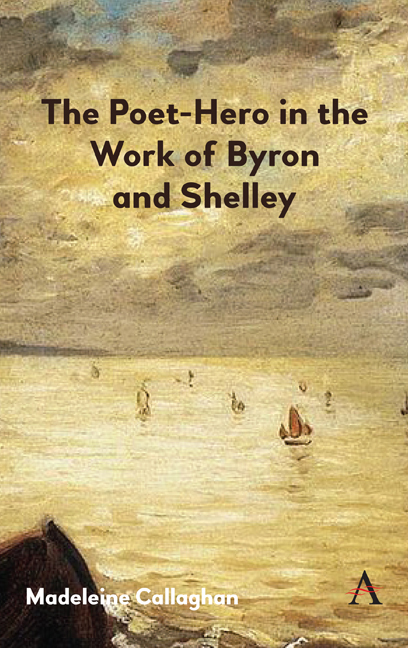Book contents
- Frontmatter
- Dedication
- Contents
- Acknowledgements
- Note on Texts and Abbreviations
- Introduction: The Poet-Hero: ‘Who shall trace the void?’
- Part I Byron
- Chapter One ‘A tyrant-spell’: The Byronic (Poet-)Hero in Manfred, Childe Harold's Pilgrimage and Beppo
- Chapter Two ‘Degraded to a Doge’: Inappropriate Poetic Heroism in Marino Faliero
- Chapter Three ‘Thoughts unspeakable’: Poetic Heroism under Pressure in Cain and The Deformed Transformed
- Chapter Four Poetic Heroism and Authority: Don Juan and ‘Epistle to Augusta’
- Interchapter
- Part II Shelley
- Conclusion The Byronic and the Shelleyan Poet-Hero
- Bibliography
- Index
Chapter One - ‘A tyrant-spell’: The Byronic (Poet-)Hero in Manfred, Childe Harold's Pilgrimage and Beppo
from Part I - Byron
Published online by Cambridge University Press: 30 March 2019
- Frontmatter
- Dedication
- Contents
- Acknowledgements
- Note on Texts and Abbreviations
- Introduction: The Poet-Hero: ‘Who shall trace the void?’
- Part I Byron
- Chapter One ‘A tyrant-spell’: The Byronic (Poet-)Hero in Manfred, Childe Harold's Pilgrimage and Beppo
- Chapter Two ‘Degraded to a Doge’: Inappropriate Poetic Heroism in Marino Faliero
- Chapter Three ‘Thoughts unspeakable’: Poetic Heroism under Pressure in Cain and The Deformed Transformed
- Chapter Four Poetic Heroism and Authority: Don Juan and ‘Epistle to Augusta’
- Interchapter
- Part II Shelley
- Conclusion The Byronic and the Shelleyan Poet-Hero
- Bibliography
- Index
Summary
Providing the critic with no equivalent to Wordsworth's ‘Preface to Lyrical Ballads’ or Shelley's A Defence of Poetry, it would seem that Byron is more poet than thinker, more lord than poet. However, Byron's heroic poetics are developed in his poetry rather than through expositionary prose. Byron's poet-heroes reflect on one another, suggestive of the way in which his poetry is ‘a medium for thinking’, and specifically, a medium for thinking about the status of the poet-hero as it develops from text to text throughout his body of work. Focusing on Childe Harold's Pilgrimage, Manfred and Beppo, this chapter shows how poetic heroism in Byron's work grows out of separateness from others fraught by complex awareness of the danger of the solitude. Though Harold is distinguished by being ‘the most unfit / Of men to herd with Man’ (CHP III, 12: 100– 101), Byron, the poet who styled himself as ‘born for opposition’ (BLJ 4: 82), both magisterially asserts and criticizes such an instinct to be apart from others. In Childe Harold's Pilgrimage, Byron's development of his poet-hero sees him develop his speaker in a manner that responds to the ‘I’ of Wordsworth's lyrics poems, particularly ‘Lines Written a Few Miles above Tintern Abbey’ (hereafter ‘Tintern Abbey’). Byron shapes an independent voice drawn from his differences from the older poet with whom Shelley, in the summer of 1816, ‘used to dose [Byron] with Wordsworth physic even to nausea’. Harold and the speaker can both lay claim to the status of ‘masterful, moody outlaws’, but it is the speaker, the poethero, who edges Harold out of the poem in a move that anticipates its comic restaging in Don Juan. In Manfred, Byron marries ‘glamorous aesthetics’ of Satanism with the despair of Milton's anti-hero, testing the possibilities of the will in the post-Revolutionary age to communicate ‘moral and political angst’ as opposed to ‘ideological certitude’. Manfred is distinguished by his mastery of language and rejection of community, supernatural or human, becoming a poet-hero that Byron refuses to lionize or condemn. Beppo's archly knowing poetry builds on Manfred's nihilistic power, where Manfred's self-assertion is remade into the distanced and entertaining performance of Beppo's speaker. Here, the poet-hero becomes a figure of depth and experience whose outsider quality and detachment earns him his right and cements his ethical duty to pronounce upon society.
- Type
- Chapter
- Information
- The Poet-Hero in the Work of Byron and Shelley , pp. 19 - 38Publisher: Anthem PressPrint publication year: 2019



